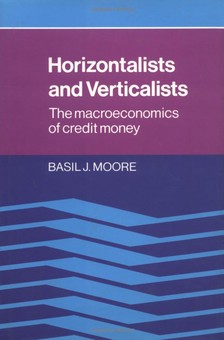Horizontalists and Verticalists: 25 years later
 The latest issue of the Review of Keynesian Economics includes a special mini-symposium honouring the 25th anniversary of Basil Moore's book, Horizontalists and Verticalists (1988). Basil Moore is Professor Extraordinary in the Department of Economics at Stellenbosch University.
The latest issue of the Review of Keynesian Economics includes a special mini-symposium honouring the 25th anniversary of Basil Moore's book, Horizontalists and Verticalists (1988). Basil Moore is Professor Extraordinary in the Department of Economics at Stellenbosch University.
The book has been particularly influential in advocating a "horizontalist" view of monetary policy, which is that in a credit-based economy, the money supply is endogenous and determined by demand, and not by central bank supply of high-powered money, as the "verticalists" believe. In one of the mini-symposium articles, the authors' (Bindseil and König) assessment is that "the book has impressively stood the test of time and, despite part of textbook economics still insisting on the money multiplier as an explanation for the money supply, it is not much of an exaggeration to say that we have all become ‘Horizontalists’ in the last 25 years."
The special issue's contents can be viewed here (one of the articles can be downloaded freely - click here).
Login
(for staff & registered students)
Upcoming Seminars
Monday 16 February 202612:10-13:10
Dr Matthew Olckers
Topic: "Do Digital Cash Transfers Create Persistent Financial Inclusion? Evidence from Mobile Money in Togo"
13:10-14:10
Prof Gregory Lane
Topic: "Beliefs, forecasts, and investments: Experimental evidence from India"
12:10-13:10
Frank Bohn
Topic: "The “Benefits” of being small: Loose fiscal policy in the European Monetary Union"
BER Weekly
23 Jan 2026 Free Weekly Review | Number 3 | 23 January 2026This report covers the key domestic and international data releases over the past week....
Read the full issue
Upcoming Seminars
Monday 16 February 202612:10-13:10
Dr Matthew Olckers
Topic: "Do Digital Cash Transfers Create Persistent Financial Inclusion? Evidence from Mobile Money in Togo"
13:10-14:10
Prof Gregory Lane
Topic: "Beliefs, forecasts, and investments: Experimental evidence from India"
12:10-13:10
Frank Bohn
Topic: "The “Benefits” of being small: Loose fiscal policy in the European Monetary Union"
BER Weekly
23 Jan 2026 Free Weekly Review | Number 3 | 23 January 2026This report covers the key domestic and international data releases over the past week....
Read the full issue
